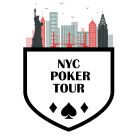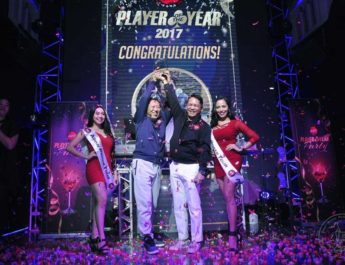John Cynn already had his chance at poker immortality. It was back in 2016, actually. The former IT consultant and Indiana University graduate found himself deep in the World Series of Poker main event, with a shot at the final table. But after making a move on a short stack with Q-10, he ran into the A-K of Gordon Vayo to bust in 11th place.
The $650,000 payday was a nice consolation prize, but Cynn clearly wanted more. Two years later, he returned to the main event, and not only made the final table, but won it all for $8.8 million and his first WSOP bracelet.
It’s now been two months since his life-changing victory, and Card Player caught up with Cynn to learn more about his win, how he got into the game, and what he plans to do next.
Card Player: Can you talk a bit about your start in poker? How did you progress as a player?
John Cynn: I started playing poker in high school. I got hooked pretty quickly. I was pretty bad for about four or five years before I became a break-even player. It wasn’t until after college, I met my friend Lance who taught me a lot more about poker. I eventually hit a point where I thought I could do pretty decent playing poker. I got laid off from my job about a year after college, and decided to play poker for a year. I then decided to go back to work, thinking that poker would always be there, but ultimately I ended up going back to poker.
CP: What kind of games were you playing in prior to your first deep run in the main event, and how did that change after nearly making the final table?
JC: I had just started getting into the medium and higher-stakes private game world in Los Angeles. It started out okay, but soon I was playing in games where I would pay when I lost, but didn’t get paid when I won. These poor decisions on my part led to losing a large portion of my bankroll fairly quickly, even though I had some success in other tournaments after the first deep run. All of this was an incredible learning experience for me and it’s unreal to have an even bigger opportunity having made a lot of mistakes already.
CP: What did you learn about playing in the main event in 2016 that helped you during your run in 2018?
 JC: I think the thing you learn the most is how to stay focused for a longer period of time, over days. In 2016, it seemed like I was short stacked almost the whole way. I always went to bed thinking I was going to bust early the next day. That year my roommate Lance Keating got 32nd place, so it was really cool to walk down with him every day to play together.
JC: I think the thing you learn the most is how to stay focused for a longer period of time, over days. In 2016, it seemed like I was short stacked almost the whole way. I always went to bed thinking I was going to bust early the next day. That year my roommate Lance Keating got 32nd place, so it was really cool to walk down with him every day to play together.
In 2018, I ran unbelievably well. I definitely had some of the luckiest days of my life playing poker where I could do no wrong. Because of that, I almost always had a lot of chips, and when I would get short I would find a spot to double up and get a stack to work with again. I definitely opened up my game quite a bit, perhaps it was because I had a stack, but I definitely played way more hands in 2018 than I did in 2016.
CP: Most players don’t make multiple deep runs in the main event. After 2016, what was your attitude about getting back there? Were you feeling like that was probably your one shot at the main event, or did it feel like you had unfinished business to take care of?
JC: You always want to make a deep run in a tournament, but you never know if it’ll happen. I attribute a lot of my win to luck but also to my mentality of not caring where I finished. It seems crazy to say but I could’ve finished 12th and I would’ve been ecstatic as long as I played my game.
CP: You didn’t feel any added pressure to make the final table, having missed out on it two years earlier?
JC: I remember joking with my friends [on the rail] that I could go on a bad run of cards and bust in 12th place. They thought I was crazy to crack such jokes, but I remember thinking that I would’ve been totally at peace with it as long as I played well. Again, it’s really that mindset that I attribute to winning… That I didn’t care how I finished as long as I feel like I played well. I also credit that mindset to a friend who passed away within the last year. She really taught me that you have to enjoy the journey, regardless of what happens.
CP: This year’s final table bubble was nuts, and obviously featured a big cooler with a three-way all-in, but what do you think is the proper approach for a situation like that, where making the final table is so important. How important was it during this part of the tournament to accumulate chips vs. keep yourself out of trouble?
JC: I didn’t see many mistakes on the official final-table bubble. I remember thinking that everyone was playing really well and fairly snug, so the bubble could take a while. It would seem like an easy spot to accumulate chips, but everyone at the final table was capable so you always had to kind of watch out.
CP: How did you sleep during the main event? Were nerves ever an issue?
JC: I have to believe I slept fairly well compared to the rest of the players at the final table. I had a playlist that I would listen to help me fall asleep, but I would always wake up before my alarm clock went off. I was always nervous leading up to play, but somehow that always went away once the first hand got out of the way. I listened to a lot of music during my breaks that would remind me of my friend that passed away recently. It really helped me keep everything in perspective.
CP: Have you watched the coverage of the main event yet? Obviously you are happy with the final result, but do you have any regrets or is there something you wish you had done differently?
JC: I’ve seen some of it but still haven’t seen it all. I can’t wait to watch it when it airs again on ESPN or when I get a hold of the taping. It’ll be really interesting for me to remember what I was thinking at the time and what was actually happening. There are actually many things I regret during the tournament. I wish I had played some hands differently. I know I make a ton of mistakes, I was just fortunate enough of them worked out in my favor. I also had the thought of eating Oreos at the table as a tribute to Rounders. I used to love watching that movie. Maybe next time!
CP: It’s now been two months since you won, are you still homeless or have you figured out where you are going to live? Have you made any fun, extravagant purchases or treated yourself yet?
JC: The plan before the main event was to move into my friends guest house and travel for a year. I joked that I was homeless because I hadn’t technically moved my stuff into his place yet and I was just staying in friends’ rooms at the Rio during the main. I still want to travel for a year, but things are a little different now. I have made one or two ‘dumb’ decisions with my money but nothing that is too extravagant. I’m unsure if or when that’ll happen. I do splurge on food to treat myself.
CP: You’ve been seen on Poker After Dark and playing in the Ivey Room at Aria since your win. How have these sessions gone for you, and do you aspire to become a regular in these high-stakes games?
JC: I’ve done really well in these sessions. I’m honestly still just running really hot, it’s kind of insane. In both Poker After Dark sessions I started out down quite a bit, but ended both sessions coming back. I would love to become a regular in the high-stakes games as they’re actually a lot of fun, but I also want to spend a very large amount of time traveling as well.
CP: What do you feel your duties are, if any, as the main event champion when it comes to being a poker ambassador? Some main event champions have taken the money and disappeared, others have continued to play in the spotlight. What is your plan when it comes to your poker career?
JC: I’ll still continue to play poker, although it seems hard to find time recently unless there is a big event or game going on. However, I also do want to travel and see the world like initially planned. There are a few cool projects that I’m working on that I’m pretty excited about. However knowing how those will go or where I will end up is tough to project. You never imagine that you’d be the ‘ambassador of poker’ one day, so it’s hard to say what I should or shouldn’t be doing. However, if I can use this platform somehow to help people beyond poker that would be really cool for me.
Source: cardplayer.com





